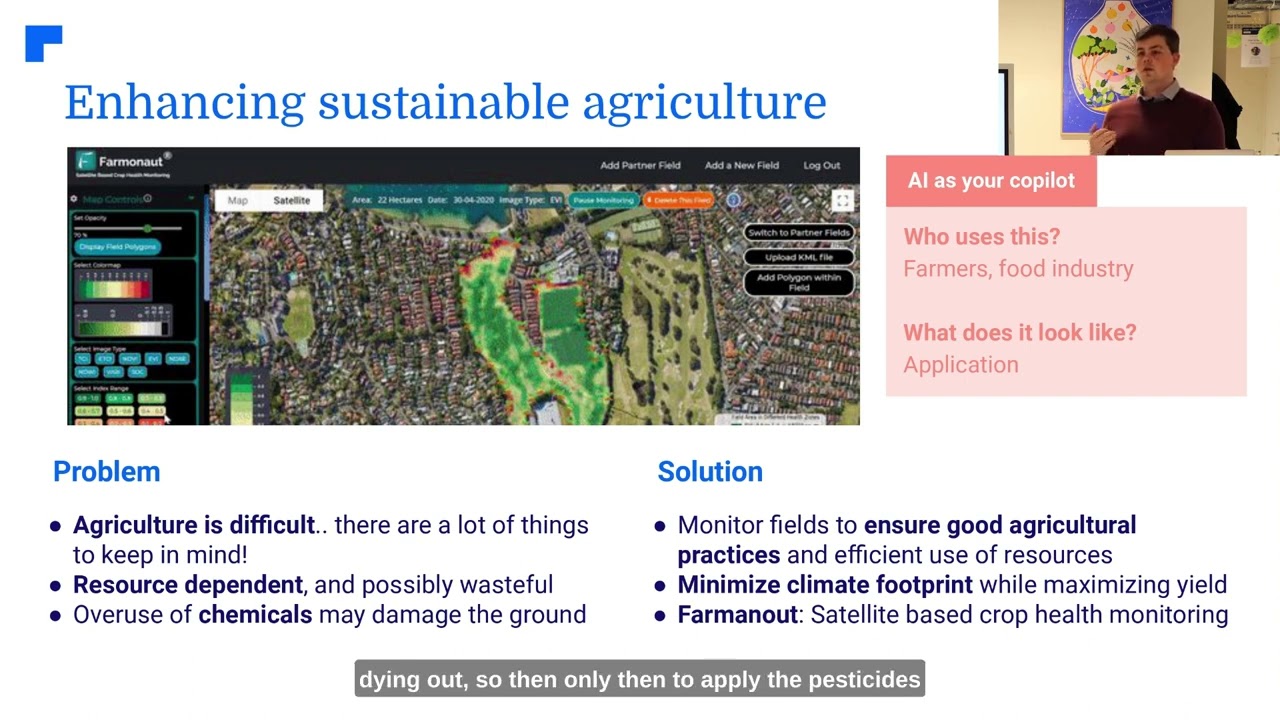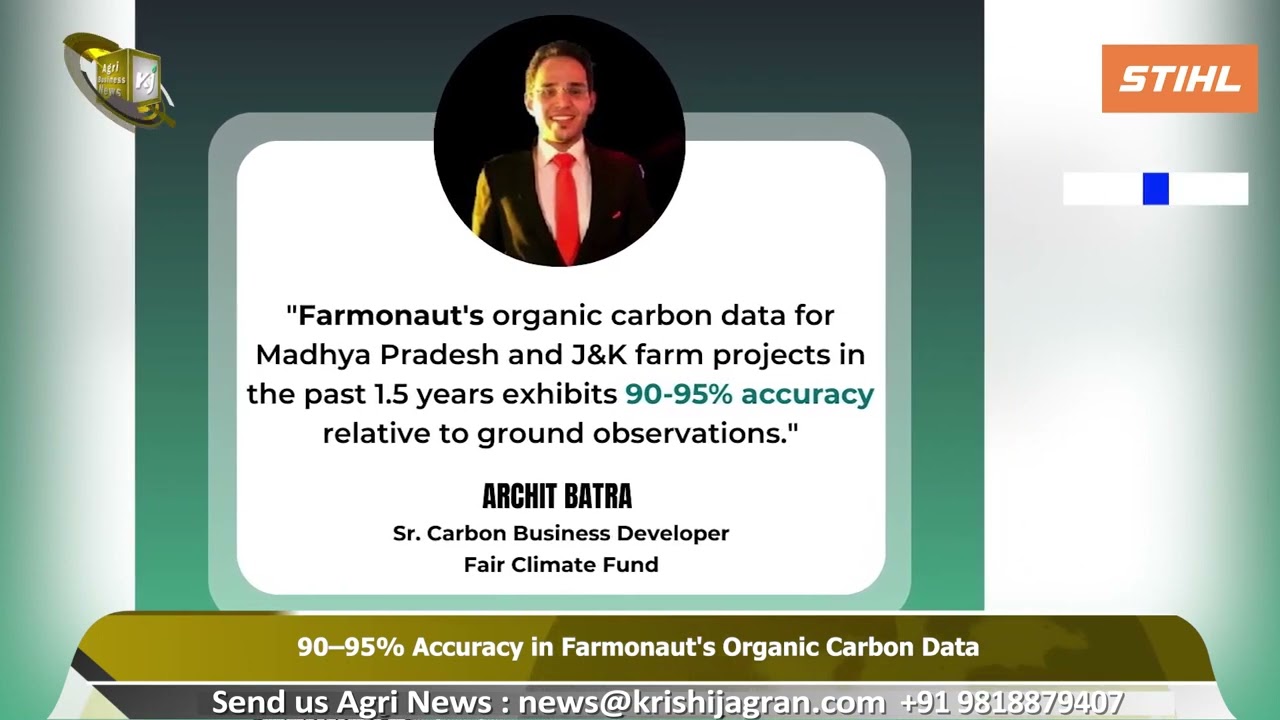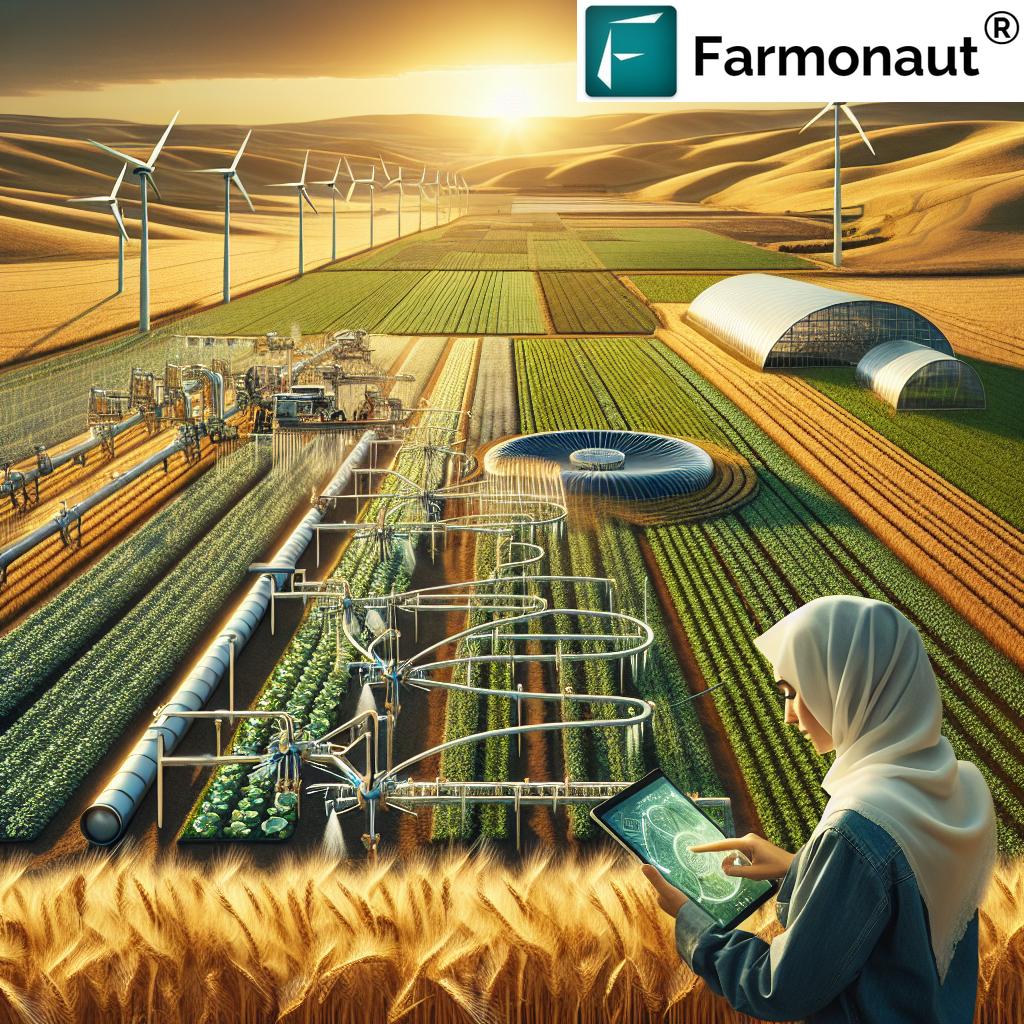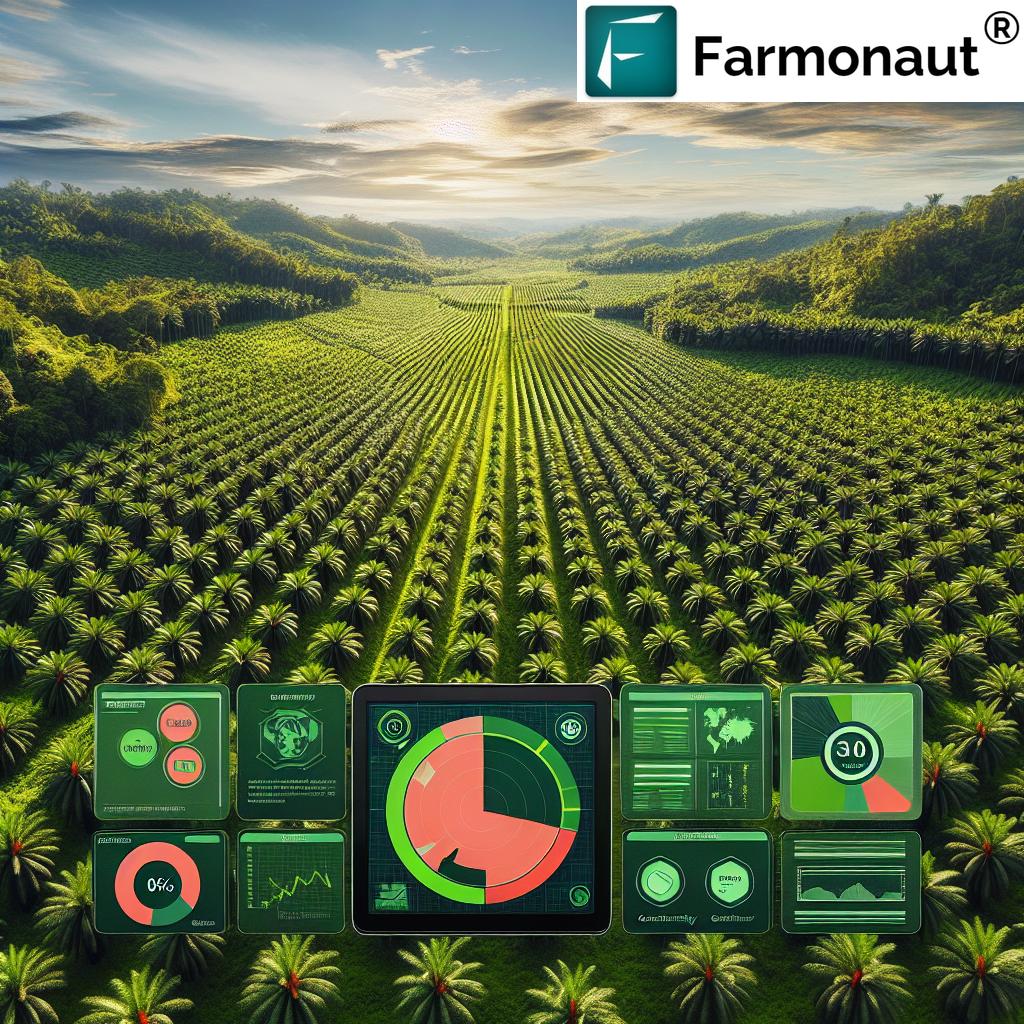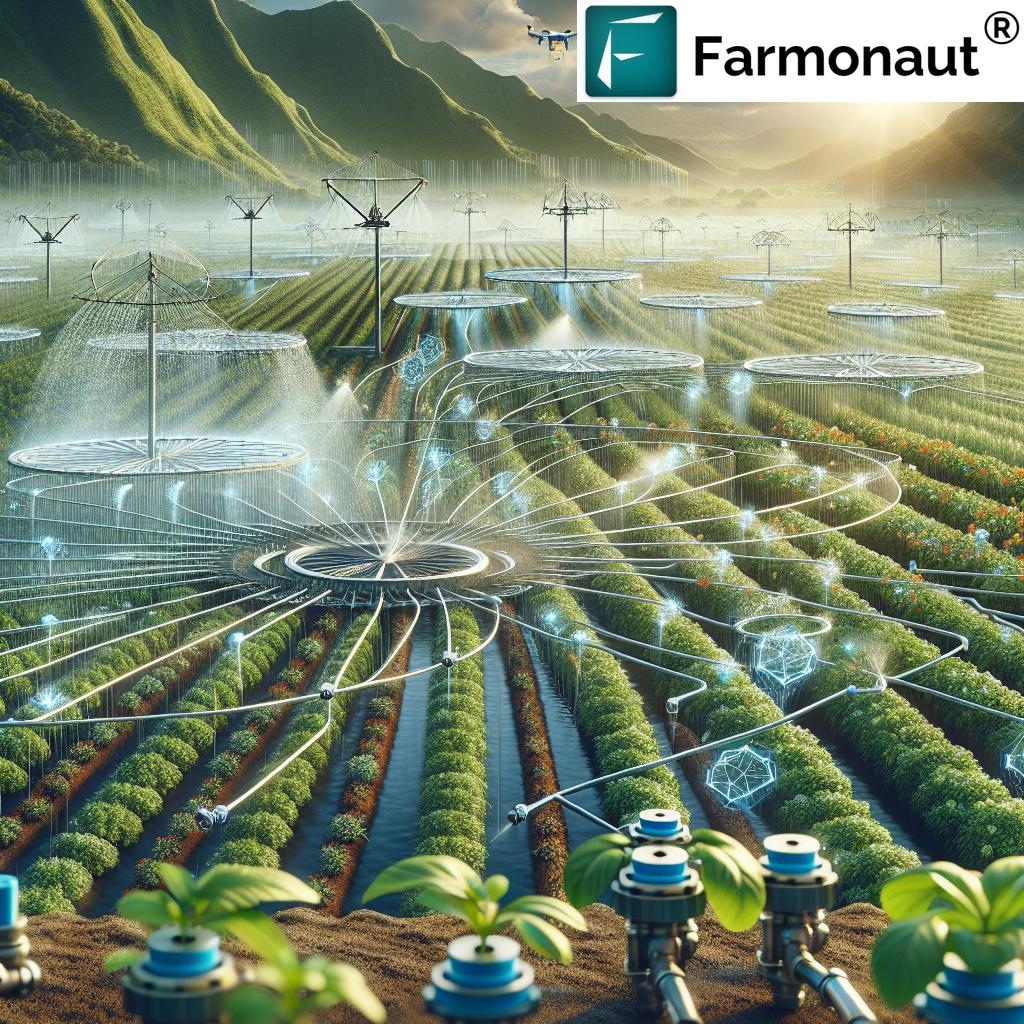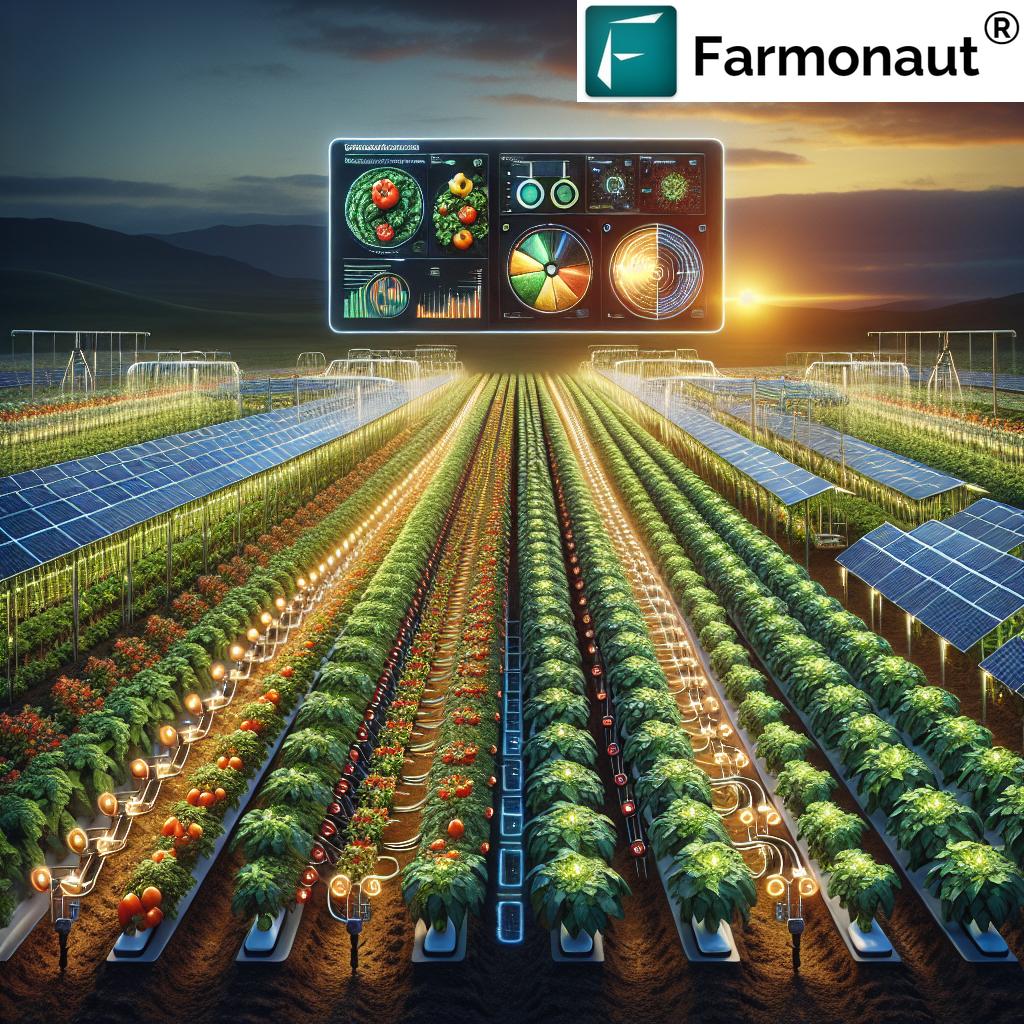Kazakhstan Pioneers Regenerative Agriculture: Tackling Climate Change with Sustainable Farming Practices
“Kazakhstan aims to establish eco-climate stations using remote sensing to measure carbon balance across 2.7 million square kilometers.”
As we delve into the groundbreaking initiatives taking place in Kazakhstan, it’s crucial to understand the pivotal role that regenerative agriculture is playing in addressing climate change and promoting sustainable farming practices. At the forefront of this agricultural revolution, Kazakhstan is setting an example for nations worldwide by embracing innovative technologies and eco-friendly approaches to farming.
The United Nations Climate Change Conference: A Catalyst for Change
The ongoing United Nations Climate Change Conference in Baku, Azerbaijan, has become a pivotal platform for Kazakhstan to spearhead sustainable agricultural initiatives. On the fourth day of the conference, a momentous step was taken as the Kazakh Ministry of Ecology and Natural Resources formalized a memorandum of understanding with Ormex, a Paris-based leader in regenerative agriculture, and Chapter Zero Kazakhstan.
This collaboration aims to foster sustainable agricultural practices across Kazakhstan that focus on:
- Reducing carbon emissions
- Enhancing soil health
- Improving water retention
- Promoting biodiversity
The partnership marks a significant milestone in Kazakhstan’s journey towards sustainable development and climate change adaptation in agriculture. By leveraging cutting-edge technologies and implementing regenerative agriculture practices, Kazakhstan is poised to transform its agricultural landscape while simultaneously addressing pressing environmental concerns.

Understanding Regenerative Agriculture
Regenerative agriculture is a holistic approach to farming that goes beyond sustainability. It aims to actively improve and restore ecosystems while producing food and other agricultural products. This innovative farming method focuses on:
- Rebuilding soil organic matter
- Restoring degraded soil biodiversity
- Improving the water cycle
- Enhancing ecosystem services
- Increasing resilience to climate fluctuation
By adopting regenerative agriculture practices, Kazakhstan is not only addressing immediate agricultural needs but also investing in the long-term health of its ecosystems and the well-being of its citizens.
Key Initiatives and Technologies
The partnership between Kazakhstan’s Ministry of Ecology and Natural Resources, Ormex, and Chapter Zero Kazakhstan encompasses several groundbreaking initiatives:
1. Establishment of Eco-Climate Stations
A standout feature of the agreement is the proposal to establish eco-climate stations throughout Kazakhstan. These stations will utilize cutting-edge technologies, including remote sensing and monitoring, to accurately measure the carbon balance and emission gases. This initiative is expected to form an integral part of Kazakhstan’s climate change adaptation strategy by providing vital data on the effectiveness of emissions-reduction efforts and promoting environmental sustainability.
2. Implementation of Advanced Monitoring Solutions
To support the goals of this initiative, advanced agricultural monitoring solutions are being implemented. These technologies offer farmers data-driven insights to implement sustainable farming techniques effectively. One such solution is provided by Farmonaut, a pioneering agricultural technology company that offers satellite-based farm management solutions.
Farmonaut’s platform includes:
- Real-time crop health monitoring
- AI-based advisory systems
- Blockchain-based traceability
- Resource management tools
These tools align perfectly with Kazakhstan’s goals of promoting sustainable agriculture and reducing carbon emissions. By leveraging satellite imagery and artificial intelligence, farmers can make informed decisions about irrigation, fertilizer usage, and pest management, ultimately optimizing crop yields and reducing resource wastage.
3. Training Programs for Local Farmers
The partnership promises benefits for local farmers, who will access training programs that introduce them to advanced regenerative agricultural techniques. These programs are mindful of Kazakhstan’s diverse ecological landscapes and aim to equip farmers with the knowledge and skills necessary to implement sustainable farming practices effectively.
The Role of Technology in Sustainable Agriculture
As we navigate the complexities of climate change and sustainable agriculture, technology plays a crucial role in driving innovation and efficiency. Remote sensing technologies, in particular, are revolutionizing the way we approach farming and environmental monitoring.
Remote Sensing in Agriculture
Remote sensing technologies are instrumental in gathering valuable data about crop health, soil moisture, and environmental conditions. By utilizing satellite imagery and other remote sensing tools, farmers and researchers can:
- Monitor crop growth and health in real-time
- Detect early signs of pest infestations or disease
- Assess soil moisture levels and irrigation needs
- Measure carbon sequestration in agricultural lands
- Track changes in land use and vegetation cover
These capabilities are essential for implementing effective regenerative agriculture practices and measuring their impact on the environment.
“Kazakhstan’s regenerative agriculture initiative targets improving soil health and biodiversity on over 220 million hectares of agricultural land.”
The Farmonaut Advantage
In the context of Kazakhstan’s initiatives, Farmonaut’s advanced agricultural monitoring solutions offer significant advantages. Their platform provides:
- Satellite-based crop health monitoring
- AI-driven personalized farm advisory
- Blockchain-based product traceability
- Fleet and resource management tools
- Carbon footprint tracking
These features align perfectly with Kazakhstan’s goals of promoting sustainable agriculture, reducing carbon emissions, and enhancing rural development. By providing farmers with data-driven insights, Farmonaut empowers them to make informed decisions that optimize resource use and improve crop yields while minimizing environmental impact.
The Impact of Regenerative Agriculture on Climate Change
Regenerative agriculture practices have the potential to significantly impact climate change mitigation efforts. By focusing on soil health improvement strategies and carbon emissions reduction in farming, these practices can:
- Increase soil organic carbon content
- Enhance water retention in soil
- Reduce the need for synthetic fertilizers
- Promote biodiversity
- Improve overall ecosystem resilience
Kazakhstan’s commitment to implementing these practices on a large scale demonstrates its dedication to addressing climate change through agricultural innovation.
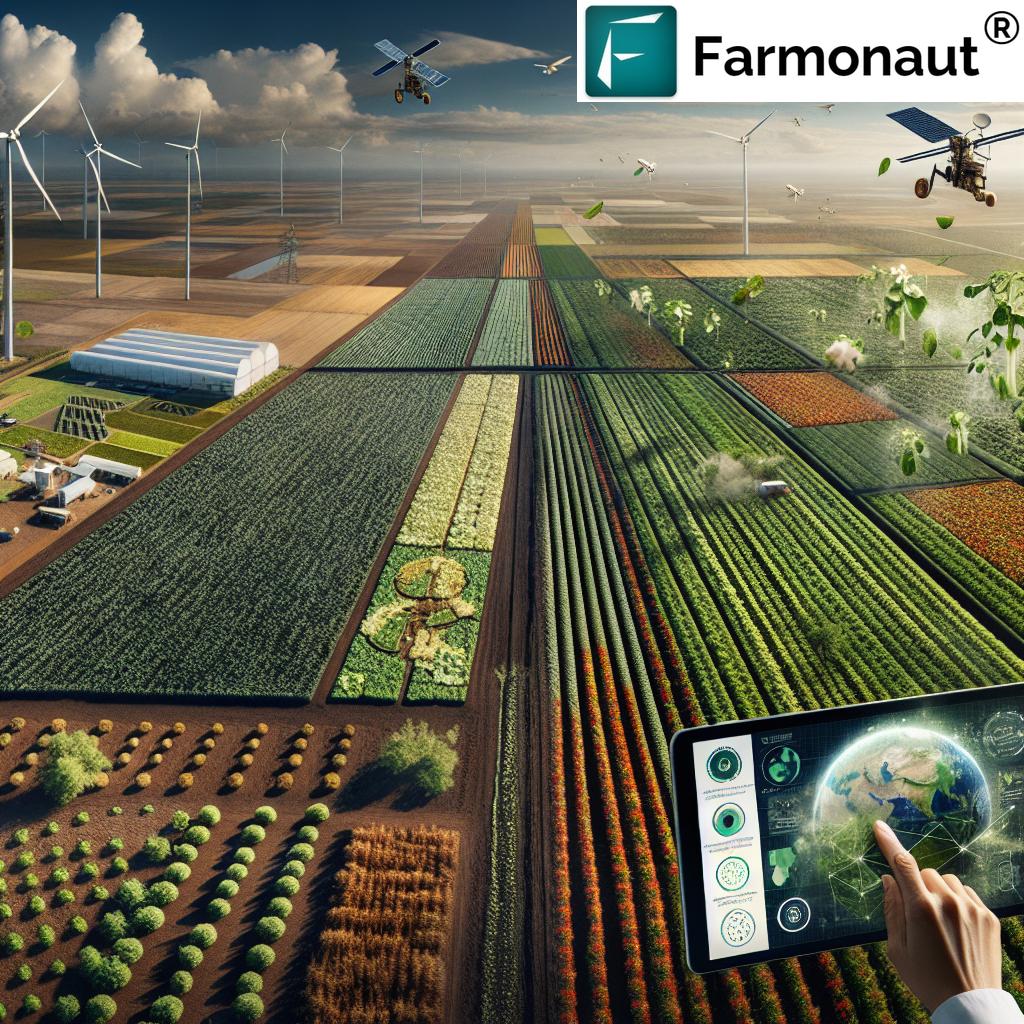
Regenerative Agriculture Practices and Their Benefits in Kazakhstan
| Practice | Description | Environmental Benefits |
|---|---|---|
| Cover Cropping | Planting crops between growing seasons to protect and enrich the soil | Improves soil health, reduces erosion, increases carbon sequestration |
| No-Till Farming | Minimal soil disturbance by planting crops without tilling the soil | Enhances soil structure, reduces carbon emissions, improves water retention |
| Crop Rotation | Planting different crops in sequence to improve soil health and pest management | Boosts soil fertility, reduces pest and disease pressure, increases biodiversity |
| Agroforestry | Integrating trees and shrubs into crop and animal farming systems | Enhances carbon sequestration, improves soil health, provides habitat for wildlife |
| Composting | Converting organic waste into nutrient-rich soil amendments | Reduces waste, improves soil structure, enhances nutrient cycling |
The Role of Eco-Climate Stations in Kazakhstan’s Climate Strategy
The establishment of eco-climate stations across Kazakhstan represents a significant step towards comprehensive environmental monitoring and climate change adaptation. These stations will play a crucial role in:
- Measuring carbon balance and emission gases
- Providing real-time data on environmental conditions
- Supporting evidence-based decision-making in agriculture and environmental policy
- Facilitating research on climate change impacts and mitigation strategies
By leveraging remote sensing technologies and advanced monitoring systems, these stations will contribute valuable data to Kazakhstan’s climate change adaptation strategy, enabling more targeted and effective interventions in the agricultural sector.
Empowering Farmers with Data-Driven Insights
One of the key aspects of Kazakhstan’s regenerative agriculture initiative is the empowerment of farmers through access to data-driven insights. By leveraging technologies like those offered by Farmonaut, farmers can:
- Make informed decisions about crop management
- Optimize resource use, including water and fertilizers
- Implement precision agriculture techniques
- Monitor and improve soil health
- Track their progress in adopting sustainable farming practices
This data-driven approach not only enhances farm productivity but also supports the broader goals of reducing carbon emissions and promoting environmental sustainability in agriculture.
The Economic Impact of Regenerative Agriculture
While the environmental benefits of regenerative agriculture are clear, it’s important to note the potential economic impacts as well. By adopting these practices, Kazakhstan stands to:
- Increase agricultural productivity and resilience
- Reduce input costs for farmers
- Create new opportunities in rural areas
- Enhance food security
- Potentially access new markets for sustainably produced goods
The integration of technology and sustainable farming practices can lead to a more robust and resilient agricultural sector, contributing to Kazakhstan’s overall economic development.
Challenges and Future Outlook
While Kazakhstan’s initiatives in regenerative agriculture and climate change adaptation are promising, there are challenges to overcome:
- Scaling up regenerative practices across diverse agricultural landscapes
- Ensuring widespread adoption of new technologies among farmers
- Balancing short-term economic needs with long-term environmental goals
- Adapting to changing climate conditions and extreme weather events
Despite these challenges, the commitment shown by Kazakhstan’s government and its partners suggests a positive outlook for the future of sustainable agriculture in the country. By continuing to invest in innovative technologies, research, and farmer education, Kazakhstan is well-positioned to become a leader in regenerative agriculture and climate-smart farming practices.
The Global Significance of Kazakhstan’s Initiatives
Kazakhstan’s efforts in promoting regenerative agriculture and addressing climate change through sustainable farming practices have global significance. As the world grapples with the challenges of food security, environmental degradation, and climate change, Kazakhstan’s initiatives offer valuable insights and potential solutions that can be adapted and implemented in other regions.
Key aspects of global significance include:
- Demonstrating the scalability of regenerative agriculture practices
- Showcasing the integration of technology in sustainable farming
- Providing a model for public-private partnerships in agricultural innovation
- Contributing to global efforts in carbon emissions reduction and climate change mitigation
By sharing its experiences and learnings, Kazakhstan can play a crucial role in advancing sustainable agriculture practices worldwide.
The Role of Farmonaut in Supporting Sustainable Agriculture
As we explore the transformative potential of regenerative agriculture in Kazakhstan, it’s worth highlighting the role that advanced agricultural technology platforms like Farmonaut can play in supporting these initiatives. Farmonaut’s suite of tools and services aligns closely with the goals of sustainable farming and climate change adaptation in agriculture.
Key features of Farmonaut that support sustainable agriculture include:
- Satellite-based crop health monitoring for optimized resource use
- AI-driven advisory systems for precision agriculture
- Blockchain-based traceability for supply chain transparency
- Carbon footprint tracking to support emissions reduction efforts
By providing farmers and agricultural stakeholders with access to these advanced tools, Farmonaut contributes to the broader goals of promoting sustainable farming practices and enhancing agricultural resilience in the face of climate change.
For those interested in leveraging these technologies for their agricultural operations, Farmonaut offers various subscription options:
Conclusion: A Sustainable Future for Kazakhstan’s Agriculture
As we’ve explored throughout this article, Kazakhstan’s pioneering efforts in regenerative agriculture and climate change adaptation represent a significant step towards a more sustainable and resilient agricultural future. By embracing innovative technologies, implementing regenerative farming practices, and fostering collaboration between government, private sector, and farmers, Kazakhstan is setting an example for sustainable agricultural development on a global scale.
The initiatives undertaken, including the establishment of eco-climate stations, the adoption of advanced monitoring technologies, and the focus on soil health and biodiversity, demonstrate a comprehensive approach to addressing the complex challenges of climate change and environmental degradation. As these efforts continue to unfold, we can expect to see tangible benefits in terms of improved soil health, increased carbon sequestration, enhanced water retention, and overall ecosystem resilience.
For farmers, agribusinesses, and policymakers looking to contribute to this sustainable agricultural revolution, tools like those offered by Farmonaut provide valuable support. By leveraging satellite technology, AI, and data-driven insights, stakeholders can make informed decisions that align with the principles of regenerative agriculture and contribute to broader climate change mitigation efforts.
As we look to the future, Kazakhstan’s commitment to sustainable agriculture not only promises to transform its own agricultural landscape but also offers valuable lessons and inspiration for other nations grappling with similar challenges. By continuing to invest in innovation, education, and sustainable practices, Kazakhstan is well-positioned to lead the way in creating a more resilient, productive, and environmentally friendly agricultural sector.
FAQs
- What is regenerative agriculture?
Regenerative agriculture is a holistic farming approach that focuses on improving soil health, enhancing biodiversity, and increasing ecosystem resilience while producing food and other agricultural products. - How does regenerative agriculture help combat climate change?
Regenerative agriculture practices help sequester carbon in the soil, reduce greenhouse gas emissions, improve water retention, and enhance overall ecosystem health, all of which contribute to mitigating climate change impacts. - What role does technology play in Kazakhstan’s sustainable agriculture initiatives?
Technology, including remote sensing, satellite imagery, and AI-driven analytics, plays a crucial role in monitoring crop health, optimizing resource use, and providing data-driven insights to farmers and policymakers. - How can farmers benefit from adopting regenerative agriculture practices?
Farmers can benefit through improved soil health, increased crop yields, reduced input costs, enhanced resilience to climate variability, and potential access to new markets for sustainably produced goods. - What are eco-climate stations, and why are they important?
Eco-climate stations are monitoring facilities that use advanced technologies to measure carbon balance and emission gases. They are important for providing accurate data on environmental conditions and the effectiveness of climate change mitigation efforts. - How does Farmonaut support sustainable agriculture initiatives?
Farmonaut provides advanced agricultural monitoring solutions, including satellite-based crop health monitoring, AI advisory systems, and carbon footprint tracking, which help farmers implement sustainable farming techniques and optimize resource use. - What are the main challenges in implementing regenerative agriculture on a large scale?
Challenges include scaling up practices across diverse landscapes, ensuring widespread technology adoption, balancing short-term economic needs with long-term environmental goals, and adapting to changing climate conditions. - How can other countries learn from Kazakhstan’s initiatives in sustainable agriculture?
Other countries can learn from Kazakhstan’s approach to integrating technology, policy, and farmer education in promoting regenerative agriculture, as well as its efforts to establish comprehensive environmental monitoring systems.
For more information on how technology can support sustainable agriculture practices, visit Farmonaut’s API or check out the API Developer Docs.






